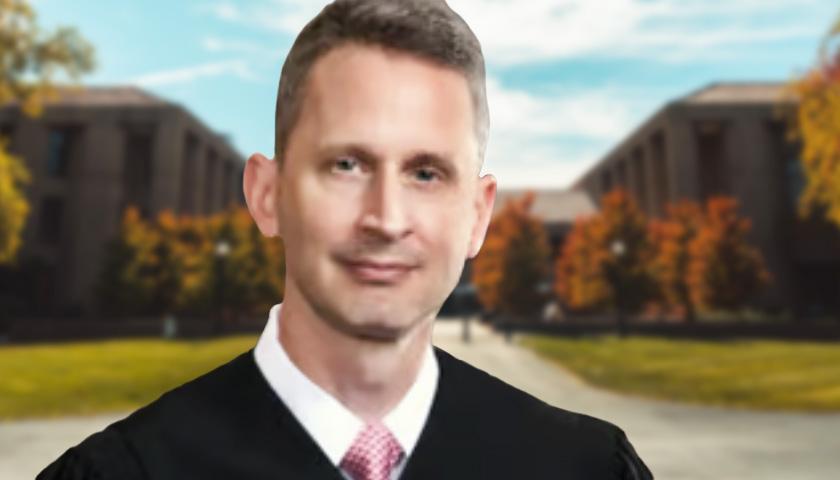NASHVILLE, Tennessee – When presented with an opportunity to hear a bill that would bring accountability and transparency to the Tennessee School Boards Association (TSBA), nine GOP legislators in the Tennessee House of Representatives– primarily freshmen – voted against it on Tuesday.
This, despite the fact that the sponsor of the bill, Representative and House Finance, Ways and Means Subcommittee Chairman Andy Holt (R-Dresden), laid out the details of the special carve-outs that the taxpayer-funded Tennessee School Boards Association (TSBA) enjoys.
Six freshmen GOP legislators–State Representatives Charlie Baum (R-Murfreesboro), Scott Cepicky (R-Culleoka), Mark Cochran (R-Englewood), Kirk Haston (R-Lobelville), Tom Leatherwood (R-Arlington), and Iris Rudder (R-Winchester)–joined three other GOP legislators– State Representatives Jim Coley (R-Bartlett), David Byrd (R-Waynesboro), and Kevin Vaughan (R-Shelby County)– and four Democrat legislators–State Representatives Vincent Dixie (D-Nashville), Jason Hodges (D-Clarksville), Harold Love (D-Nashville), and Antonio Parkinson (D-Memphis)–in defying the House GOP leadership’s wishes to have Holt’s bill recalled for consideration by the full House Education Committee.
The final vote in the committee was 13 against recalling the bill, and 8 in favor of it.
The bill failed in the House Education Administration Subcommittee last week, largely through an administrative oversight.
The Tennessee Star has featured several reports on the taxpayer-funded TSBA including:
• TSBA lobbies the state legislature while the State of Tennessee has made payments to TSBA over the past three fiscal years, which runs July 1 through June 30, in the amounts of $376,078.04 in 2017; $192,017.98 in 2018; and $145,683.67 through February 2019.
• The TSBA has a “Business Affiliate” program, which is in effect a pay-to-play scheme where vendors looking to pursue contracts with Tennessee school systems pay a fee in the amount of $1,000, $2,000, $5,000, $7,500 or $15,000 to gain various levels of access to local school systems through TSBA.
However, the $15,000 fee applies only if it is a compliance issue or illegal for the business affiliate to pay TSBA a percentage of the sales to Tennessee public schools. According to TSBA: “In the event that a fee constituting a percentage of sales is, or even possibly is, noncompliant with any law regarding a particular vendor or industry, then a lump sum fee (of $15,000) shall be negotiated.”
TSBA’s only current Premier Business Affiliate, Public Risk Insurors, confirmed to The Star that they paid a flat $15,000 annual fee for that status and to receive the benefits of the program.
• The TSBA had $5.3 million in assets at the end of 2017 and paid its top two executives annual salary and benefits of $499,000 in 2016, according to the association’s IRS Form 990.
Meanwhile $835,632 of TSBA revenues came from membership dues from participating local school boards across the state. The membership dues of each of the local school board members is paid by taxpayer dollars allocated to the school system by the local county commission or city council.
State tax dollars of more than $1.2 million in 2016 were paid by the Tennessee Department of Education to provide “contract services,” “seminars and workshops” and “conventions.”
HB 1276, sponsored by Rep. Holt to rein in TSBA through increased accountability and transparency had a chance at new life on Wednesday, as reported by The Star.
Representative Jerry Sexton (R-Bean Station), as a member of the standing Education Committee invoked Rule 83, Section 13 of the Uniform Rules of Committees of the House of Representatives, which states:
At any time after a bill or resolution has been acted upon by a subcommittee any member of the standing committee may move to recall the bill or resolution from the subcommittee to be heard at the beginning of the standing committee’s next meeting, provided the notice is timely filed under rule 83(1) so it can be printed on the committee calendar. If the motion carries by a majority of the members entitled to vote at a meeting of the committee then the bill or resolution shall be placed on calendar for the next meeting of the committee. No such motion shall be considered during the final meeting of a committee during a session.
House Education Committee Chairman Mark White (R-Memphis) invited House Assistant Chief Clerk and Chief Parliamentarian, Daniel Hicks, into the meeting to explain the parliamentary procedure.
Hicks explained the rule and said that vote that would be taken is to recall the bill to the full Committee, not a vote on the bill itself, and that it would take 13 votes for the recall.
Chairman White allowed Holt to explain the bill, so that the Committee members would know that they were voting to recall for a hearing in the next week’s meeting, particularly for those who don’t sit on the Education Administration Subcommittee.
Holt explained that what precipitated the recall to full committee is that there was some miscommunication on a particular amendment in subcommittee and that it was the last time the subcommittee would meet. Holt assured that there is no nefarious intent.
Continuing as he read from notes on the podium, Holt said, “Tennessee School Board Association was enshrined in the Tennessee General Assembly in law in 1953 and it was done so and authorized and empowered to cooperate with Tennessee school boards in it’s in-training programs for school board members and encouraging and fostering cooperation among the school boards of this state. “
Looking up and speaking directly to the committee members, Holt said he thinks, to a large degree, they have done and performed that role.
He clarified, “So, I don’t want this to be viewed as an attack on the purpose or a step toward eliminating school boards in the state of Tennessee, because that is by all means, not the effort. I think all of us realize that local control is very much necessary, and as each of us who sit on a legislative body, we recognize that decisions have to be made and there should be a process by which those decisions should be made and the school board is the most logical way to do that.”
“What has happened over time, though, is unfortunately, I think there’s been a honey hole created, if you will, where the TSBA has found a monopoly in the service they are providing to school boards. Over time, what has occurred has been an opportunity for what, I think, is a process and an institution that has been shielded from public light because they’re not subject to open records and they’re not subject to open meetings there’s not a great deal of information that’s out there available about the TSBA who is funded approximately 90 percent by taxpayer funds.”
Stating the intent of the bill, Holt said, “This is an accountability and transparency bill, and I don’t think it can be described as anything other than that.”
Holt then provided TSBA data from 2016, that the director was paid $309,000, annually and by pointing out again that the numbers are three years old, implied that the figures were likely to be higher in 2019.
In a moment of levity, Holt said, “I mean that’s pretty close to what we make as lawmakers,” which was met with laughter.
Putting the salary figure in perspective, Holt told the committee, “In comparison, it’s 50 percent higher than the state commissioner of education and it’s 50 percent higher than the salary of the governor. Those are some pretty striking figures for an executive director.”
In terms of the organization as a whole, Holt reported, “In 2017, TSBA made $390,653 in investment income, just in investment income. So, they had a $708,000 profit.”
“In my opinion, an entity that’s funded 90 percent with public funds, in my heart of hearts don’t believe should be profiting $700,000 on annual basis. Granted, we’re in a good time economically, but that’s a little excessive in my opinion.”
Going on, Holt revealed that as of the end of 2017, TSBA had $3,293,554 in liquid assets.
Relating it to the allocations from funding that the governor puts in the budget and the legislature approves, Holt said, “If we want to ask ourselves why does education funding seem to be lost somewhere between the time when we assign money here in the legislature, where is it lost between here and the classroom, I think this is one of the sources by which a significant amount of money is being stuffed away and holed away.”
Saying he is not impugning the work that’s done by TSBA, Holt added, “What I’m saying is I think that in addition to the relatively good work, good product that I think many of us have benefited from, they have found an opportunity to provide a monopolistic service that is enshrined in law.”
Holt also reported that 90 percent of TSBAs 2016 revenues of $2,221,347 came from Tennessee taxpayers through no-bid contracts, something he thought all would recognize as something that education money should not be used for.
In addition to the 90 percent of taxpayer funding TSBA receives, Holt also told the committee of the process by which vendors can get access to school boards through a process that TSBA utilizes from which they derive about 10 percent of their income.
Holt explained that a vendor comes to TSBA and sponsors events and do other things to become a member of a certain status like platinum or gold. If a contract is let between the vendor and the local school board, Holt said, “The TSBA actually benefits a percentage of that contract in perpetuity as long as the contract is there.”
“Again, I don’t think that leads to transparency,” Holt concluded.
The proposed legislation regarding TSBA, Holt said, would take its mandates directly from the statute that governs the Tennessee Organization of School Superintendents, or TOSS. If TSBA or any other school board membership organizations or for-profit entities may offer as a vendor their other products and services to school boards, they will be subject to the state’s procurement laws.
Posing it in an alternative way, Holt asked rhetorically, “Other entities are subject to procurement laws, why would we not again apply those procurement laws to the TSBA in this situation?”
House Bill 1276 also prohibits TSBA or any other associations that accept school boards as members from receiving any compensation, contributions or any economic benefit from vendors doing business with or seeking to business with Tennessee school boards.
Lastly, HB 1276 would require that TSBA or any other organizations that accept school boards as members shall be subject to Tennessee open records and open meeting laws.
“That, to me, is probably the most important,” said Holt.
Holt closed with a final point, “If an entity is funded 90 percent with public dollars, the dollars that all of you all are very familiar with – that escape very quickly – why would we not want to shine more light instead of less light on the situation?”
Before going to a vote, Representative Antonio Parkinson (D-Memphis) had what he said was a parliamentary question, in that the sponsor presented the entire bill, but the other side hadn’t been heard. Parkinson continued his attempt by proposing, “Maybe at a minimum we should let the other side make a statement also so we can really make an informed decision as to whether we want to recall this bill or not. I may want to recall the bill, but I don’t know what the other side has to say.”
Chairman White responded by gaveling and saying the chair overrides that, a move which was met with under-the-breath comments from within the audience.
By roll call vote, the recall failed 13 to 8.
Voting No to the recall were Representatives Charlie Baum (R-Murfreesboro), David Byrd (R-Waynesboro), Scott Cepicky (R-Culleoka), Mark Cochran (R-Englewood), Jim Coley (R-Bartlett), Vincent Dixie (D-Nashville), Kirk Haston (R-Lobelville), Jason Hodges (D-Clarksville), Tom Leatherwood (R-Arlington), Harold Love (D-Nashville), Antonio Parkinson (D-Memphis), Iris Rudder (R-Winchester) and Kevin Vaughan (R-Shelby County).
Voting in favor of the recall were Representatives Bill Dunn (R-Knoxville), Debra Moody (R-Covington), John Ragan (R-Oak Ridge), Jerry Sexton (R-Bean Station), Terri Lynn Weaver (R-Lancaster), Ryan Williams (R-Cookeville) and John Mark Windle (D-Livingston).
Representatives John DeBerry (D-Memphis) and Chris Hurt (R-Halls) were not present.
All of the Republican Representatives who voted No to the recall were given an opportunity to comment on their vote for this story.
Only freshman Representative Mark Cochran (R-Englewood), chose to reply.
Cochran’s email response read, “I really appreciate you reaching out. While recalling a bill is an available tool in the legislature, it is very rarely used. I believe bypassing the subcommittee process is a potentially harmful precedent to set. Subcommittees are essential in vetting and improving new bills. Although I voted against the motion, I believe Chairman Holt is an excellent legislator and champion of conservatism. I look forward to working with him on this and other future issues.”
Earlier in the day, the Human Life Protection Act under HB 1029 was recalled from the House Public Health Subcommittee to the full Health Committee pursuant to the same Rule 83(13).
– – –
Laura Baigert is a senior reporter at The Tennessee Star.
Photo Kirk Haston by Kirk Haston. “Scott Cepicky” by Scott Cepicky. “Tom Leatherwood” by Tom Leatherwood. “Mark Cochran” by Mark Cochran.






Looks like the “industrial education complex” has gotten it’s teeth into a bunch of newbies already. Now watch as siphoned-off taxpayer dollars flow into their campaign war chests!
Tennesseans want the Deep State gone, that’s why Ms. Black is sitting on the sidelines now and Mr. Corker saw the writing on the wall. The good news, as freshmen, these shills will be easily replaced!